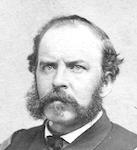 Open main menu
Open main menu
 Open main menu
Open main menu

A. Morin
(1823 - 1892)
Home State: Pennsylvania
Branch of Service: Infantry
Before Antietam
Age 39, from Philadelphia, he enrolled on 3 September 1861 and mustered as First Lieutenant, Company D, 90th Pennsylvania Infantry on 5 December in Philadelphia.
On the Campaign
He was wounded by a gunshot through his face in action at Antietam on 17 September 1862.
The rest of the War
James Grant of the Christian Commission was on the field after the battle and later wrote:
While moving around amongst the wounded of Gen. Sedgwick's Division, on the night after Antietam, my attention was called by a disabled officer to a friend of his, badly wounded in the face, and lying out somewhere without a covering. Following his directions, and throwing the rays of my lantern towards the foot of a wooden fence, I soon discovered the object of my search. He was a Lieutenant of a Pennsylvania Regiment. The ball had entered one side of the cheek and passed out at the other, grazing his tongue, and carrying away several of his teeth. His face was horribly swollen, and he could not speak. On asking him if he was Lieut. M. [Morin], of Philadelphia, he assented by a nod of his head. It was raining pretty heavily and he was quite wet; straw was procured, a bed made, and he was left for the night as comfortable as possible.He returned to duty, was promoted to Captain on 1 January 1864 (to date from 2 November 1863), and transferred at that rank to Company D, 186th Pennsylvania Infantry on 25 May 1864.
During the next two days, the Surgeons were all so busy, that his wound, which had been hurriedly dressed on the field, remained untouched; yet he showed no signs of impatience. In the inflamed, wounded condition of his mouth, nothing could be passed down his throat. On the third day, as the Surgeons still had more to do than they could manage, we assisted them in washing and re-dressing wounds, most of which had remained untouched since the battle. With some hesitation, I took the Lieutenant's case in hand, and, after two hours' labor, succeeded in cutting away his whiskers and washing the wound pretty thoroughly, both inside and outside the mouth. This done, and all the clotted blood and matter cleared away, the swelling abated, and he began to articulate a little. A day or so afterward, he could swallow liquids; and being carefully washed daily, in less than a week he was able to travel to Philadelphia.
I saw him next in his own house. Tears of gratitude filled his eyes and those of his wife; and it amply repaid me to be introduced to Mrs. M. by the gallant soldier, as "the man who picked me up at midnight and dressed my wound, when I had given myself up to die."
After the War
He was an engraver in Philadelphia.
References & notes
Service information from Bates1 and the Card File.2 The quote above from Edward P. Smith's Incidents among Shot and Shell (1868). His occupation from his death certificate. His gravesite is on Findagrave, source also of his picture, from a photograph contributed by Scott Hann.
He's probably the son of Alexander C. Morin, a prolific "seal engraver and die sinker" in Philadelphia before 1860.
Birth
1823; Philmont, PA
Death
05/13/1892; Philadelphia, PA; burial in Mount Peace Cemetery, Philadelphia, PA
1 Bates, Samuel Penniman, History of the Pennsylvania Volunteers, 1861-65, Harrisburg: State of Pennsylvania, 1868-1871 [AotW citation 11898]
2 Commonwealth of Pennsylvania, Adjutant-General, Pennsylvania Civil War Veterans' Card File, 1861-1866, Published <2005, first accessed 01 July 2005, <http://www.digitalarchives.state.pa.us/archive.asp?view=ArchiveIndexes&ArchiveID=17> [AotW citation 23416]